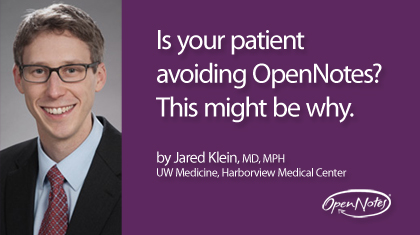
by Jared Klein, MD, MPH
SEATTLE, WA – Sharon [pseud] had struggled with her blood pressure for years, but when she ended up in the ER experiencing chest pain I couldn’t help thinking how I may have failed as her doctor. We had discussed her blood pressure many times, but I’m not sure if she really “got it.” What if she had been able to review her clinic notes online and gain a better understanding of her condition? Could that have helped her avoid this serious health situation? Sharon had been a patient in my clinic for many years and we were an early adopter of OpenNotes, but she never jumped at this opportunity. Why?
There is a growing body of evidence to suggest that OpenNotes can be a useful tool to educate, motivate and engage patients in their health care. But what about patients who are reluctant to use this new technology? Why aren’t they choosing to read their notes online?
To explore these questions I led a study exploring the perceptions of patients who opt not to read their doctors’ notes online. We assessed patients’ attitudes about viewing notes, comparing patients who did or did not access notes online. Nearly all patients had Internet access and most had chronic medical conditions such as diabetes or high blood pressure. We found that virtually all participants were enthusiastic about the potential benefits of OpenNotes, whether or not they actually went on to read their notes. However, patients who expressed apprehension about privacy or who thought that viewing notes would cause excess worry were much less likely to view their notes.
Our findings suggests that, rather than simply touting the benefits of OpenNotes, more should be done to reassure patients who are concerned about risks of viewing notes online. Research still needs to be done to figure out just what can or should be done to provide reassurance. In the meantime, there are some commonsense strategies that could be incredibly helpful. Doctors should strive to make notes more readable and electronic medical record vendors should support this by providing enhanced patient education materials. Peer navigators could be deployed to share their experience with OpenNotes and guide reluctant patients. Individuals concerned about privacy should be informed about existing protections and also understand that their data is already in electronic form – failing to access this information simply limits its usefulness without providing additional protection.
As a primary care doctor seeing a diverse panel of patients at our county hospital in Seattle, I often worry my patients may be falling behind the curve. As prices rise, can they afford their housing? As new skills are required, will they be able to keep their jobs? This is no different when it comes to health care – as the digital world becomes entrenched with the medical world, we need to ensure all patients benefit from innovations such as OpenNotes. This may require additional investment beyond the technology itself, but is crucial to avoid exacerbating health disparities.
Dr. Jared Klein is the medical director of the After Care Clinic and an attending physician in the Adult Medicine Clinic, both at Harborview Medical Center.
You can read his paper here.



